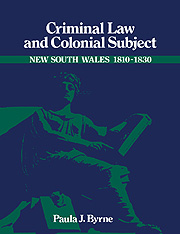Book contents
- Frontmatter
- Contents
- Figures
- Tables
- Author's Note
- Acknowledgements
- Abbreviations
- 1 Introduction
- Part 1 Law and the Person
- Part 2 Offence in the Wilderness
- Part 3 Suspicious Characters: Police and People
- 6 The Structure and Style of Policing
- 7 Popular Use of Law
- Part 4 The Courtroom
- Appendix
- Bibliography
- Index
7 - Popular Use of Law
Published online by Cambridge University Press: 15 December 2009
- Frontmatter
- Contents
- Figures
- Tables
- Author's Note
- Acknowledgements
- Abbreviations
- 1 Introduction
- Part 1 Law and the Person
- Part 2 Offence in the Wilderness
- Part 3 Suspicious Characters: Police and People
- 6 The Structure and Style of Policing
- 7 Popular Use of Law
- Part 4 The Courtroom
- Appendix
- Bibliography
- Index
Summary
The importance of exchange to the survival of bushrangers drew numbers of the population into an illegal economy. This economy was intricately tied to law due to the rituals of hiding and transferring property and the possibility of information being given. The practice of criminal law was thus bound up with popular understanding. The local population could take law out of the hands of legislators, administrators and magistrates and put it to community use. Between 1810 and 1830 the colonial population shaped and modified what it understood to be criminal law. It made use of some regulations and ignored others. It brought information to courts for various reasons associated with revenge or personal acquisitions, as well as what was felt to be a wrong. Like bushranging, these understandings of criminal law created a particular culture of hiding and transferring property, of accusation and defence.
‘Community’ has been a subject pursued with some difficulty by historians. As a term it has created problems because of its connotations of ‘togetherness, the warmth and security of relations among people’. When historians of early modern England looked for such warmth they found that it barely existed: social relations were intolerant in the pre-industrial village. It is possible to reject the term but, as C. J. Calhoun has argued, ‘community’ is useful in exploring how people relate to each other, how they see themselves in society. Calhoun discusses community in terms of its ‘weakness’ and ‘strength’, thereby valuing good relations.
- Type
- Chapter
- Information
- Criminal Law and Colonial Subject , pp. 208 - 262Publisher: Cambridge University PressPrint publication year: 1993



